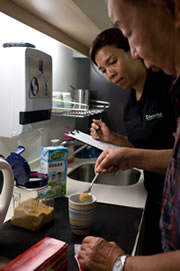RTC’s Occupational Therapy Assessments
 RTC’s therapists are trained in conducting specialized assessments to accurately identify issues and difficulties of the client, which allows the therapist, and clients to plan more targeted treatment.
RTC’s therapists are trained in conducting specialized assessments to accurately identify issues and difficulties of the client, which allows the therapist, and clients to plan more targeted treatment.
The following are assessments RTC conduct:
- Comprehensive Assessments:
For clients who have recently been discharged from hospital or with health conditions which affect their performance in their daily task (like bathing), home care task (like cooking, cleaning), difficulties in returning to work/school, or performing their leisure and social activities. These assessments have a component of motor (strength), cognitive (planning, memory) and communication/social skills.
- Standardized Functional Assessments:
Functional Independent Measure (FIMS) is an accurte assessment which provides information on a clients ability to perform their daily living task such as dressing, walking, and social interaction. A FIM assessment helps the therapist to focus the treatment to increase the client’s independence in daily function and caregiver training.
Assessment on Motor and Proces Skills (AMPS) is a well recognises assessment which is valid in many cultures & society. Through the performance of a daily task (e.g making a snadwhich), the AMPS allows the therapist to assess the client’s performance in the aspects of motor and process (thinking) skills. The AMPS assesment is sensitive to track changes in performance outcome as well as direct therapist in both the physical and cognitive areas for client rehabilitation.
- Movement Analysis Assessments:
Some clients after a recent health condition like a stroke or a fall may have issues with their mobility and motor control which does not allow them to be able to attend to their roles (as a parent or worker). This assessment identifies movement issues the client has which affect their quality of movement.
- Myofascial Pain Assessments:
“Do you suffer from frozen shoulders, a headache which comes with a stiff neck?”These could be Myofascial Pain (MPS) which is a condition characterized by chronic and, sometimes, severe pain. It is associated with and caused by “trigger points” (TrPs), which are localized and extremely painful “knots” found in any skeletal muscle of the body. The symptoms can range from referred or radiating pain through myofascial trigger points to specific pains in other areas of the body to just localised pain at the site of the trigger point.
MPS may be related to a closer-studied complex condition known as fibromyalgia, or some commonly call it the “pain all over” syndrome. By accepted definition, the pain of fibromyalgia is generalized, occurring above and below the waist and on both sides of the body. On the other hand, myofascial pain occurs in a more limited area of the body, either only around the shoulder and neck, and or on only one side of the body. The pain you feel may be associated with fatigue and sleep disturbances; poor posture when performing certain movements; or from a general lack of physical conditioning
Conditions that benefit from Myofascial release include: Frozen shoulders, Carpal Tunnel Syndrome (CTS), Tennis Elbow (Lateral Epicondylitis), Golfers’ Elbow (Medial Epicondylitis), Trigger Thumb or finger, Tension headaches, generalized back aches, knee and calf pain, just to mention a few.
RTC’s therapist will perform a thorough assessment of your range of motion, locate and identify muscles and “tigger points” before performing myofascial release; which uses deep gentle fascia manipulation and massage – one of the most effective ways to relieve pain.
- Community Mobility Assessments:
Upon discharge from a hospital, most clients are not able to venture out to their void deck, shops and markets as before due to memory issues, disorientation or even difficulty in mobility. RTC’s therapist perform community mobility assessments, to assist clients to identify issues they face and to train the clients to be a confident participant of the community again.
- Return to Driving Assessments:
Even with Singapore’s excellent public transport, driving a car, taxi or a motorcycle is an important task to most Singaporeans. After a health condition like a stroke, most clients are uncertain and fearful of returning to drive. RTC provides return to driving assessments and plans driving rehabilitation programs, prescribes vehicle modifications to allow clients to return to driving safely.

